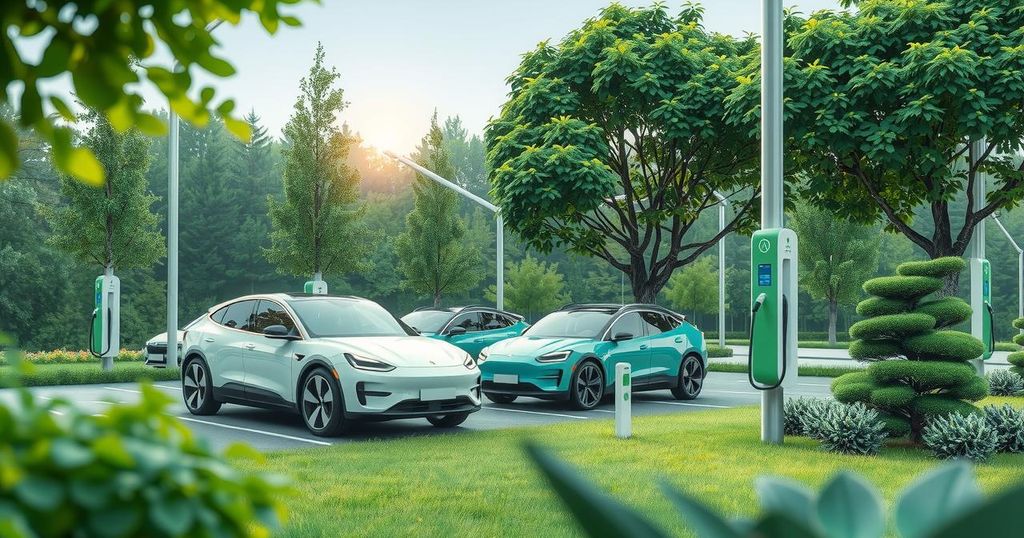Rwanda’s Rwf1.2 Billion Carbon Market Initiative to Boost Electric Vehicle Adoption

Rwanda has launched a Rwf1.2 billion initiative to establish a carbon market, which will promote electric vehicle adoption through stakeholder awareness and capacity building. Funded by the GGGI, this initiative is vital for developing carbon reduction projects across various sectors. It aims to attract private investments and address the challenges of charging infrastructure, while Rwanda collaborates internationally to strengthen its carbon market strategy.
Rwanda’s government has launched a Rwf1.2 billion initiative to establish a carbon market, aimed at building awareness and capacity among various stakeholders, thereby promoting the transition to electric vehicles (EVs). This project, known as the Rwanda Article 6 Readiness and Carbon Market Framework Operationalisation, is funded by the Global Green Growth Institute and will be executed in partnership with the Rwanda Environment Management Authority over the course of two years. It will support the development of high-quality carbon reduction projects across key sectors such as agriculture, transport, energy, and waste management.
A carbon market allows for trading carbon credits, which represent one tonne of carbon reduction, enabling businesses to compensate for their emissions through investments in environmentally beneficial projects. The framework seeks to enhance private sector involvement in creating a carbon-neutral economy, with projections indicating a need for up to $900 million in funding to fully adopt EVs and the necessary infrastructure by 2030. Financial incentives are also available for investors participating in the carbon market based on the emissions reductions achieved.
Srinivas Cheruvu, Managing Director of CFAO Mobility Rwanda, emphasized the potential for EVs to attract investments in the carbon market due to their cost efficiency and emission reduction benefits. The BYD Dolphin electric vehicle exemplifies this, offering significant savings on charging costs compared to fuel expenses for similar trips. Furthermore, mobile charging options increase convenience by allowing users to charge vehicles at home, enhancing the appeal of EVs in Rwanda.
Cheruvu acknowledged that tax incentives play an important role in increasing EV adoption, anticipating further government initiatives to promote clean energy and innovative technologies. However, challenges remain, such as the lengthy charging times associated with insufficient public charging infrastructure, particularly rapid chargers. In response, the Rwanda Green Fund is financing the expansion of EV infrastructure, including the development of charging stations.
The Deputy Director General of REMA, Faustin Munyazikwiye, reiterated the importance of renewable energy projects within Rwanda’s carbon market strategy. Partnerships with nations, including Singapore and Sweden, are being pursued to enhance capacity-building and project design, ultimately mobilizing climate finance for sustainability initiatives. Rwanda’s commitment to carbon credit trading is aligned with agreements established under Article 6 of the Paris Agreement, positioning the nation to meet its climate objectives.
At the forthcoming COP28 in Dubai, Rwanda will introduce its National Carbon Market Framework, designed to guide carbon credit trading and encourage the adoption of sustainable practices among businesses. REMA continues to address implementation challenges and improve the carbon market’s transparency and functionality. The ultimate goal is to draw in international investments, advance sustainable development, and contribute meaningfully to global climate mitigation efforts. Caroline Raes, GGGI’s Country Representative in Rwanda, also highlighted how enhancing participation in carbon markets could unlock significant financial resources and accelerate Rwanda’s climate action efforts.
In summary, Rwanda’s Rwf1.2 billion carbon market initiative is expected to facilitate the widespread adoption of electric vehicles within the country by enhancing technical support and awareness among stakeholders. Financial incentives and partnerships are crucial for attracting investments, while addressing challenges such as charging infrastructure will foster further growth in the EV market. Ultimately, this endeavor aims to position Rwanda as a leader in sustainable development and climate change mitigation.
Original Source: www.newtimes.co.rw




